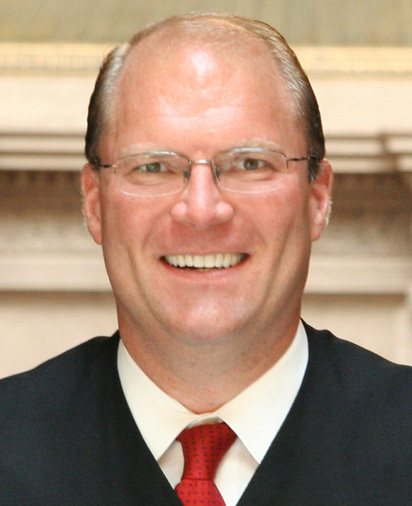Doe Decision “Overrules” U.S. Supreme Court
Wisconsin justices knew coordination was occurring. So they simply tried to rewrite federal law.
The recent Wisconsin Supreme Court decision which killed the John Doe probe of coordination between Scott Walker’s campaign and outside groups tells us a lot about the four justices who signed on to the majority opinion. For starters, it suggests they are incompetent when interpreting the US Constitution and US Supreme Court election law decisions. Justice Michael Gableman’s majority decision (joined by Justices David Prosser, Pat Roggensack, and Annette Ziegler) starts on the wrong foot early on when it attempts to define the issue:
The specific issue presented is whether the evidence gathered in the John Doe proceedings provide a reasonable belief that Wisconsin’s campaign finance law was violated by a campaign committee’s coordination with independent advocacy organizations.
Gableman and his cohorts are apparently unable to recognize the obvious contradiction in this sentence. An advocacy organization that coordinates with a candidate cannot be “independent.” This is inherent in virtually every US Supreme Court election law decision:
……independent expenditures may well provide little assistance to the candidate’s campaign, and indeed may prove counterproductive. The absence of prearrangement and coordination of an expenditure with the candidate or his agent not only undermines the value of the expenditure to the candidate, but also alleviates the danger that expenditures will be given as a quid pro quo for improper commitments from the candidate.
The quote is from the grandfather of these decisions, Valeo v Buckley (usually referred to as Buckley), written in 1976. The paragraph quoted above is taken from the part of the decision where the court discussed its rationale for limiting the application of a federal elections law which capped the amount of all independent campaign expenditures. Instead the court applied the spending cap only to communications that explicitly advocated the election or defeat of a candidate, often referred to as “express advocacy.” Less explicit advocacy, sometimes misleadingly called “issue advertising,” was exempted from the dollar limit.
In a footnote, the U.S. Supreme Court further explained its rationale, saying the limit on independent groups is not needed because their expenditures are made “totally independently of the candidate and his campaign” and should these expenditures instead be “controlled or coordinated with the candidate,” they are then “treated as contributions,” meaning the candidate must disclose them.
For an organization wanting to influence an election, Buckley—and the decisions following it—offer three choices:
- Working independently of a candidate and avoiding words such as “vote for” or defeat,” it could collect and spend unlimited amounts of money.
- Advocating expressly for or against a candidate while adhering to spending caps.
- Coordinating with a candidate, who then must report the value as a campaign contribution.
The US Supreme Court’s election law decisions have been widely criticized for underestimating the dangers of unlimited campaign spending. However, it is clear the justices believed they had reached the right balance between limiting speech and preventing corruption, and the lack of coordination between candidate and independent group played an important role in preventing abuses.
Gableman and his fellow majority justices’ failure at reading comprehension when it comes to U.S. Supreme Court decisions might not have been fatal. Earlier, Federal Judge Rudolph Randa made the same mistake when he attempted to end the John Doe investigation and in reversing his decision, the 7th Circuit Court of Appeals included this helpful summary:
Starting with Buckley v. Valeo, ….the Supreme Court has stated repeatedly that, although the First Amendment protects truly independent expenditures for political speech, the government is entitled to regulate coordination between candidates’ campaigns and purportedly independent groups…… This is so because Buckley held that the Constitution allows limits on how much one person can contribute to a politician’s campaign. If campaigns tell potential contributors to divert money to nominally independent groups that have agreed to do the campaigns’ bidding, these contribution limits become porous, and the requirement that politicians’ campaign committees disclose the donors and amounts becomes useless.
This, too, the Gableman majority ignored. When presented with the special prosecutor’s approach, which relies on Buckley’s interpretation of the First Amendment, Gableman accuses the prosecutor of employing “theories of law that do not exist.” He goes on to warn that under the Buckley interpretation “every candidate, in every campaign in which an issue advocacy group participates, would get their own John Doe proceeding and their own special prosecutor to determine the extent of any coordination.”
Gableman and the other three justices end up ruling that the restrictions on coordination apply only to express advocacy, in effect trashing the US Supreme Court’s logic in Buckley, which assumes that independent groups cannot coordinate with the candidate. The very lack of coordination, in the US court’s view, is part of the reason that financial caps on independent groups not practicing express advocacy could be safely removed.
In their conclusion that the First Amendment prohibits regulation of coordination between outside groups and candidates when there is no express advocacy, the Gableman majority repeat the argument made by Randa, which was emphatically and unanimously rejected by the 7th Circuit Court of Appeals:
No opinion issued by the Supreme Court, or by any court of appeals, establishes (“clearly” or otherwise) that the First Amendment forbids regulation of coordination between campaign committees and issue advocacy groups—let alone that the First Amendment forbids even an inquiry into that topic.
Gableman’s beef is not with the special prosecutor, but with the US Supreme Court, which ruled independent groups are free to spend and say whatever they want, with only two restrictions: they don’t coordinate with the candidate or explicitly advocate for or against a candidate. In essence this decision is an attempt by the Wisconsin Supreme Court to overrule the US Supreme Court.
Why or how did four state justices veer so far afield of the law of the land? Part of the explanation, I believe, is simple incompetence. However, other factors seem to have been in play.
A major factor is ideology. My experience is that ideology makes people behave stupidly, because they believe they already know the answers. They also surround themselves with people who share their ideology. Thus they are immune to evidence that contradicts their world view. The problem afflicts both liberals and conservatives. (I should note that both the 7th Circuit Court of Appeals judge who pointed out Randa’s mistakes and Justice Patrick Crooks, who wrote a scathing critique of the Gableman decision, are conservatives.)
Gableman and the majority justices give every indication they had made up their minds long before delving into this case. They declined to refer the matter back to a district court for the presentation of evidence, or even to hear oral argument from the participants, before rendering their decision.
The Gableman majority were so enamored of the right wing groups being investigated they described them as “these brave individuals.” By contrast, their dislike of the prosecutors is palpable. They repeat accusations that “targets were restrained under police supervision and denied the ability to contact their attorneys,” apparently without making any attempt to establish the accuracy of these descriptions or giving the prosecutors an opportunity to respond.
In a case, called Caperton v Massey, the President of the Massey coal company created a non-profit corporation (“And for the Sake of the Kids”) which contributed over $3 million to elect a West Virginia Supreme Court Justice expected to rule in favor of Massey. Sure enough, this candidate was elected, refused to recuse himself, and voted in the majority in a 3-2 ruling for Massey. When Caperton appealed, the US Supreme Court called the appearance of a conflict of interest so “extreme” that the failure to recuse himself constituted a violation of the plaintiff’s Constitutional right to due process under the Fourteenth Amendment.
The Wisconsin Democracy Campaign estimates three of the groups investigated by the John Doe probe gave $8.3 million to support the four justices. According to public record, the special prosecutor asked one or more of the justices to recuse themselves because of a conflict of interest. This conflict dwarfs that in the Caperton case. (I would certainly feel terrible about ruling against someone who spent $2.6 million helping me get a job I really wanted.) Yet none of the four justices saw fit to recuse themselves or even to respond.
The decision on the Walker campaign concludes by ordering the destruction of all evidence. Thus we may never know for sure whether Walker coordinated with the supposedly “independent” organizations. However, the preponderance of evidence revealed in the various court decisions on the Doe probe strongly implies that he did, and if so, that would also be a violation of federal law.
Indeed, a footnote in the Gableman decision appears to acknowledges coordination between Walker and presumably the Wisconsin Club for Growth: “More fundamentally, however, as a member of the first express advocacy group, the candidate at issue in this case and his agents had an absolute constitutional right to interact with a political organization of which he was a member, and improper coordination cannot be presumed by such contacts.” Such coordination was illegal at the time under Wisconsin law and continues illegal under federal law.
Candidates from both parties have found work-arounds on the coordination prohibition. For example, political advisers close to the candidate leave to set up an ostensibly independent committee. They are then able to accept unlimited funds to support the candidate’s election. Their long experience with the candidate and the people leading the official committee helps guard against the two committees operating at cross purposes, without the need for direct communication.
Walker’s refusal to follow this common path has left many observers scratching their heads. Perhaps it reflects his widely-noted desire to control every aspect of a campaign, to act as both campaign strategist and candidate.
In the next few weeks there may be numerous analyses of the likely effects of the state Supreme Court decision on Wisconsin politics. For now, what we know is what it says about four of the court’s five conservatives, who tend to work in concert with Roggensack. First, they are incompetent, particularly when interpreting US Supreme Court decisions. Second, they are driven by ideology and ignore information that does not fit that ideology. Third, they have no sense of propriety, of making sure, as most courts do, that both a conflict of interest and even the appearance of a conflict is avoided.
Earlier Data Wonk articles on this subject:
Data Wonk
-
Life Expectancy in Wisconsin vs. Other States
 Dec 10th, 2025 by Bruce Thompson
Dec 10th, 2025 by Bruce Thompson
-
How Republicans Opened the Door To Redistricting
 Nov 26th, 2025 by Bruce Thompson
Nov 26th, 2025 by Bruce Thompson
-
The Connection Between Life Expectancy, Poverty and Partisanship
 Nov 21st, 2025 by Bruce Thompson
Nov 21st, 2025 by Bruce Thompson






















Judges are ideological. That might not be ideal, but it’s reality. What bothers me more is the impropriety regarding conflict of interest. Club for Growth got these justices elected. The conflict of interest is off the charts.
If this is appealed, will they be able to hold off on destroying the evidence? And is it likely to be reserved by appeal?
I wonder how many other states have a totally corrupt, bought and paid for Supreme Court. Wisconsin sure does. How deep is the corruption in Walker’s Wisconsin? Could a Republican get convicted of ANY crime in Wisconsin? Would a Republican walk away without being charged if they murdered someone in cold blood? With this hyper-corrupt Supreme Court, it is hard to see how any crimes by Republicans will ever be charged.
Thank you for your thoughtful and fact filled analysis of just how incompetent and corrupt the Wisconsin Supreme Court is. I will be linking to this story and referencing it when I speak to groups of college students about the many negatives of pursuing a teaching career in Walker’s Wisconsin.
Can someone other than the prosecutors carry this to the SCOTUS?
Great work again, Bruce. The (ab)use of the First Amendment as Gableman’s “reasoning” is exactly why this case must be appealed to SCOTUS. In fact, it’s a testament to the wimpiness of the state’s Democratic Party as to why this hasn’t happened already, because we all deserve to know what the rules are for the 2016 campaign and the future, and to see if this is truly what the Justices wanted to allow under Citizens United.
And if it’s not legal under Citizens United, and if this is the corrupt cover-up attempt it appears to be, then RECALLS are the only remedy that can be applied to these 4 WMC judges.
The same day the four ethically and intellectually challenged Wisconsin Supreme Court Justices released their majority decision, the 3rd District Federal Appeals Court released a decision reaching exactly the opposite result regarding a similar case.Granted, it was not the 7th district, which has Wisconsin in its region. However, the irony of the timing of this 3rd Appeals Court decision is compounded by the fact that the Federal Courts have never agreed with Goofy Gableman and his posse of reactionaries on this issue, as was pointed out by Justice Abrahamson in her dissent. Perhaps Gableman was dosing during constitutional Law class and missed the part where the Professor made it clear to even the stupidest law student that Federal Courts are superior to and controlling on State Courts.
daniel gordon, a federal Judge in Wisconsin had the same ruling as the Wisconsin Supreme Court
Paul, the Seventh Circuit Court of Appeals reversed Rudy Randa’s decision in the Milwaukee federal District Court, stating Randa had no jurisdiction. Citing a case that’s been overruled is just plain incompetent lawyering, sort of like Gableman’s incompetent judging.
Great analysis. The concluding paragraph sums it up. This court, with its current majority, is really a stain on the reputation of Wisconsin. It is impossible to take them at all seriously. You even have to wonder whether Gableman and Ziegler actually wrote their opinions or whether it was someone from the Wisconsin Club For Growth.
Judith, they said he had no jurisdiction in the case, but the Wisconsin Supreme Court proved his decision was the right one.
Paul you seriously see no problem whatsoever with state supreme court justices bending over backward to side with a group that played a huge role in getting them elected? All that outside money spent to elect them doesn’t concern you even a little?
PMD, they didn’t “bend over backwards” they followed the rule of the law, and confirmed what was found in both state and federal courts. Bending over backwards is what the SCOTUS did twice by changing the written words of the ACA instead of ruling against it.
Yes they certainly did. Spoken like a true partisan hack who sees every single issue through a partisan lens. Also, you didn’t answer either one of my questions, so way to spin and dodge. I expect nothing else from you though. I guess all that money spent by Club for Growth to elect those justices is fine with you because you like Walker and disagreed with the John Doe. You’re a total joke.
PMD, I saw one question and I did answer it, they followed the rule of the law. Can you answer if you think the SCOTUS followed the law by changing the meaning of the ACA by calling it a tax and then changing the meaning of what was written in the act?
The WI Supreme Court interpreted the rule of law to be contrary to precedent & written laws both at the state & federal level. Ahhh, but you moved onto talking about how much a success Obamacare is… isn’t that the strategy of a Hack? Up your game & earn your stipend from WMC.
To Daniel Goldin,
Do you have a citation for the 3rd District case you mention?
The case is”Delaware Strong Families v. Delaware Attorney General” upholding a 100 dollar disclosure requirement for coordinated contributions.
It was decided on July 16, 2015, the same day as Gableman’s decision.
Delaware Strong Families v. Delaware Attorney General, decided July 16 2015.
Tim, the ACA is a success?What world do you live in???